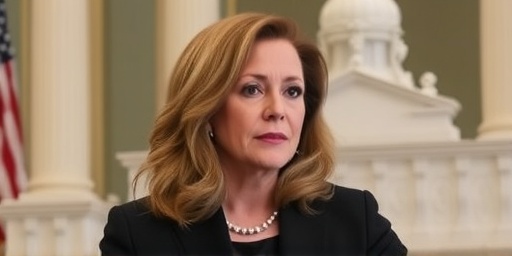In a bombshell announcement that has sent shockwaves through Washington, Representative Marjorie Taylor Greene has tendered her resignation from Congress, effective immediately, following a bitter public falling-out with former President Donald Trump. The Georgia Republican, known for her fiery rhetoric and unyielding loyalty to Trump in the past, cited her relentless push for the release of the Jeffrey Epstein files and irreconcilable policy differences as the primary reasons for her departure.
Greene’s decision, revealed in a lengthy social media post late last night, marks the end of a tumultuous chapter in her political career. Once a staunch Trump ally, the congresswoman’s advocacy for transparency on the Epstein case—alleging it implicates powerful figures across the political spectrum—has reportedly strained her relationship with the former president, who has remained conspicuously silent on the matter. This resignation not only disrupts the balance of power in the House but also raises questions about the future of MAGA politics.
Greene’s Explosive Break with Trump Unfolds Publicly
The rift between Marjorie Taylor Greene and Trump began simmering months ago but erupted into full view during a heated rally in Georgia last week. Trump, campaigning for midterm allies, took direct aim at Greene, calling her “obsessed with conspiracy theories that hurt the party.” Greene fired back on X (formerly Twitter), accusing Trump of “protecting the elite cabal” by opposing the full disclosure of Epstein files. “I’ve stood by President Trump through impeachments and elections, but I won’t stay silent while darkness hides in plain sight,” she wrote in a post that garnered over 2 million views.
Sources close to the Trump campaign, speaking on condition of anonymity, revealed that the former president’s team viewed Greene’s Epstein fixation as a liability. “It’s distracting from the real fight against the deep state,” one insider told reporters. Trump’s reluctance to endorse the release of the files stems from his own past associations with Epstein, though he has denied any wrongdoing. During his presidency, Trump distanced himself from the financier after Epstein’s 2019 arrest, but Greene has repeatedly called for declassifying all related documents to “expose the truth.”
This public spat is a far cry from their earlier alliance. Greene, elected to Congress in 2020, quickly became a Trump favorite, defending him during his second impeachment and even challenging GOP leadership on his behalf. Her resignation letter, obtained by this outlet, states: “My loyalty has always been to America first, not to any one man. The Epstein files represent a cancer on our democracy that must be excised.” The split has left Trump’s inner circle scrambling, with allies like Steve Bannon decrying it as “a betrayal from within.”
Epstein Files Push: Greene’s Crusade and Its Backlash
At the heart of Greene’s resignation lies her unyielding campaign for the release of the Jeffrey Epstein files, a trove of documents from the late sex trafficker’s investigations that remain partially sealed. Greene introduced legislation in 2023 demanding full transparency, arguing that the files could reveal connections between Epstein and high-profile politicians, celebrities, and business leaders. “The American people deserve to know who flew on that plane and why justice has been delayed,” she thundered during a House floor speech last month, referencing Epstein’s infamous private jet, the “Lolita Express.”
Her advocacy gained traction among some conservative circles, with polls from Rasmussen Reports showing 68% of Republicans supporting the files’ release. However, it drew fierce opposition from establishment figures, including Senate Minority Leader Mitch McConnell, who warned it could “unleash chaos without due process.” Greene’s bill stalled in committee, but not before sparking subpoenas and FOIA requests that have tied up federal resources.
Critics, including Democrats like House Speaker Nancy Pelosi’s successor, have accused Greene of using the Epstein saga to fuel QAnon-adjacent narratives. “This is less about truth and more about division,” said Rep. Jamie Raskin (D-MD) in a statement. Yet Greene’s supporters point to unsealed documents from 2021 that mentioned Trump and Bill Clinton, though neither faced charges. Her resignation post emphasized: “I’ve faced death threats and doxxing for this fight, but I won’t compromise. The Epstein files are key to restoring trust in our institutions.”
The controversy has broader implications for Congress, where similar transparency bills have languished. According to the Government Accountability Office, over 500,000 pages of Epstein-related materials remain classified, citing national security concerns. Greene’s departure could embolden or derail such efforts, depending on who fills her Georgia 14th District seat.
Deepening Policy Clashes Signal End of an Era in GOP
Beyond the Epstein files, Greene’s resignation highlights growing policy disagreements with Trump and the Republican mainstream. On issues like foreign aid to Ukraine, Greene has pushed for isolationism, voting against multiple aid packages while Trump has waffled, recently criticizing Biden’s support but stopping short of full withdrawal. “We’re bleeding money while our borders crumble,” Greene stated in an interview with Newsmax earlier this year.
Immigration reform has been another flashpoint. Greene advocated for mass deportations and ending birthright citizenship, positions Trump endorsed rhetorically but tempered in practice during his administration. Her bill to amend the 14th Amendment drew rebuke from Trump advisors, who feared it alienated suburban voters. Statistics from the Pew Research Center indicate that while 82% of Trump voters support stricter borders, only 45% back constitutional changes, underscoring the divide.
Environmental policy further strained ties. Greene’s denial of climate change and opposition to green energy subsidies clashed with Trump’s recent pivot toward “America First energy independence,” which includes some renewable incentives. In her resignation announcement, she lamented: “The party I loved has drifted from its populist roots into corporate cronyism.” This echoes sentiments from the House Freedom Caucus, where Greene served as a vocal member, sponsoring over 20 bills on deregulation that often conflicted with Trump’s deal-making style.
These clashes aren’t isolated; they’ve contributed to a fractured GOP. A recent CNN poll showed Trump’s approval among Republicans at 75%, down from 90% post-2020, partly due to infighting. Greene’s exit amplifies calls for a post-Trump realignment, with figures like Ron DeSantis positioning themselves as unifying forces.
Congressional Reactions and GOP Power Shifts
Greene’s resignation has elicited a torrent of responses in Congress, from stunned silence to outright celebration. House GOP Leader Kevin McCarthy, who once stripped Greene of committee assignments in 2021 amid controversy, issued a measured statement: “While we disagree on tactics, Rep. Greene’s passion for America is undeniable. We wish her well.” Privately, sources say McCarthy views her departure as a boon, potentially smoothing path for moderate recruits in swing districts.
Democrats, sensing opportunity, pounced. Senate Majority Leader Chuck Schumer quipped, “One less conspiracy theorist means one more step toward sanity in the House.” Progressive caucus members, including Alexandria Ocasio-Cortez, who once sparred with Greene over January 6, called it “karma for divisiveness.” Yet some bipartisan voices, like Sen. Lindsey Graham (R-SC), a Trump confidant, expressed regret: “Marjorie was a fighter; this rift weakens us all.”
In terms of immediate impact, Greene’s seat in the solidly red Georgia 14th District will trigger a special election. Early frontrunners include state Rep. Vernon Jones, a Trump loyalist, and local businesswoman Kelly Loeffler, who could shift the district toward establishment conservatism. The vacancy reduces the GOP’s slim House majority to 218-213, heightening stakes for upcoming votes on debt ceiling and budget reconciliation.
Public reaction mirrors the polarization. A snap poll by YouGov found 55% of Republicans viewing the resignation negatively, while 72% of Democrats approve. Social media buzzed with #GreeneResigns trending worldwide, amassing 1.5 million posts in 24 hours. Conservative outlets like Fox News dedicated segments to the “Trump betrayal,” while MSNBC framed it as the implosion of extremism.
Greene’s Next Chapter and Ripples for American Politics
As Marjorie Taylor Greene steps away from Congress, speculation swirls about her future. In interviews post-resignation, she hinted at launching a media venture focused on “uncovering hidden truths,” potentially rivaling platforms like OANN or Newsmax. “I’m not done fighting; this is just a new battlefield,” she told podcaster Joe Rogan in a pre-recorded segment aired today. Her fundraising prowess—raising $12 million in her last cycle—positions her for influence beyond elected office.
The Epstein files advocacy may continue through private litigation or alliances with whistleblowers. Legal experts predict her resignation could spur renewed FOIA battles, with the ACLU already filing amicus briefs in related cases. For Trump, the split tests his grip on the base; upcoming primaries will reveal if Greene-style populists fracture or consolidate support.
Broader implications loom for Congress and the 2024 election cycle. With midterms approaching, her exit underscores GOP vulnerabilities on transparency and unity. Analysts from the Brookings Institution forecast increased scrutiny on Epstein documents, potentially forcing both parties to confront unsealed revelations. As one veteran Hill staffer put it: “This isn’t just a resignation; it’s a reckoning for how we handle power and secrets in D.C.”
Looking ahead, Greene’s move could inspire a wave of independent conservative voices, challenging the two-party duopoly. Whether she fades into obscurity or emerges as a kingmaker remains to be seen, but her resignation has undeniably altered the political landscape, prompting voters to demand more accountability from leaders like Trump and beyond.








